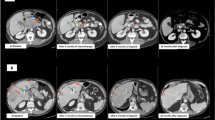Abstract
Introduction
There are approximately 40,000 new cases of pancreatic adenocarcinoma diagnosed in the USA each year. It is estimated that 5–10% of all patients with pancreatic cancer have a first-degree relative with the disease, while up to 20% of cases have a hereditary component. Individuals who carry a germline mutation in the BRCA 1 or 2 genes have an increased lifetime risk of developing pancreatic adenocarcinoma when compared with the general population.
Case report
Here, we present a case of metastatic pancreatic adenocarcinoma arising in a 67-year-old carrier of a BRCA 1 germline mutation.
Discussion
In patients with known BRCA 1 or 2 mutation-associated pancreatic adenocarcinoma, the addition of a DNA cross-linking agent such as cisplatin, oxaliplatin, or mitomycin to a standard gemcitabine chemotherapy backbone should be considered. Poly ADP-ribose inhibitors are a novel class of drug, which have demonstrated promising efficacy in trials of BRCA 1 and 2 mutant breast and ovarian cancer, and are currently undergoing prospective evaluation in advanced pancreatic cancer.


Similar content being viewed by others
References
Sweeney A, Fisher W, Wu M-F, et al. Value of pancreatic resection for cancer metastatic to the pancreas. J Surg Res. 2010;160:268–76.
Lee YT. Breast carcinoma: pattern of metastasis at autopsy. J Surg Oncol. 1983;23:175–80.
Cancer risks in BRCA2 mutation carriers. The breast cancer linkage consortium. J Natl Cancer Inst. 1999;91:1310–6.
Brose M, Rebbeck T, Calzone K, et al. Cancer risk estimates for BRCA1 mutation carriers identified in a risk evaluation program. J Natl Cancer Inst. 2002;94:1365–72.
Hahn S, Greenhalf B, Ellis I, et al. BRCA2 germline mutations in familial pancreatic carcinoma. J Natl Cancer Inst. 2003;95:214–21.
Couch F, Johnson M, Rabe K, et al. The prevalence of BRCA2 mutations in familial pancreatic cancer. Cancer Epidemiol Biomark Prev. 2007;16:342–6.
Klein A, Brune K, Petersen G, et al. Prospective risk of pancreatic cancer in familial pancreatic cancer kindreds. Cancer Res. 2004;64:2634–8.
Pogue-Geile KL, Chen R, Bronner MP, et al. Palladin mutation causes familial pancreatic cancer and suggests a new cancer mechanism. PLoS Med. 2006;3:e516.
Klein A, Borges M, Griffith M, et al. Absence of deleterious palladin mutations in patients with familial pancreatic cancer. Cancer Epidemiol Biomark Prev. 2009;18:1328–30.
Maitra A, Hruban RH. Pancreatic cancer. Annu Rev Pathol: Mech Dis. 2008;3:157–88.
McCabe N, Lord C, Tutt ANJ, et al. BRCA2-deficient CAPAN-1 cells are extremely sensitive to the inhibition of Poly (ADP-Ribose) polymerase: an issue of potency. Cancer Biol Ther. 2005;4:934–6.
Siu SWK, Chan RTT, Au GKH. Hypersensitivity reactions to oxaliplatin: experience in a single institute. Ann Oncol. 2006;17:259–61.
de Vries R, Mattijssen E, van Sorge A. Serious delayed hypersensitivity reaction to oxaliplatin. Ann Oncol. 2006;17:1723–4.
van der Heijden M, Brody J, Dezentje D, et al. In vivo therapeutic responses contingent on Fanconi anemia/BRCA2 status of the tumor. Clin Cancer Res. 2005;11:7508–15.
Chalasani P, Kurtin S, Dragovich T. Response to a third-line mitomycin C (MMC)-based chemotherapy in a patient with metastatic pancreatic adenocarcinoma carrying germline BRCA2 mutation. JOP J Pancreas. 2008;9:305–8.
Hudson KL, Holohan MK, Collins FS. Keeping pace with the times—The Genetic Information Nondiscrimination Act of 2008. N Engl J Med. 2008;358:2661–3.
Author information
Authors and Affiliations
Corresponding author
Rights and permissions
About this article
Cite this article
Lowery, M., Shah, M.A., Smyth, E. et al. A 67-Year-Old Woman with BRCA 1 Mutation Associated with Pancreatic Adenocarcinoma. J Gastrointest Canc 42, 160–164 (2011). https://doi.org/10.1007/s12029-010-9197-1
Published:
Issue Date:
DOI: https://doi.org/10.1007/s12029-010-9197-1




